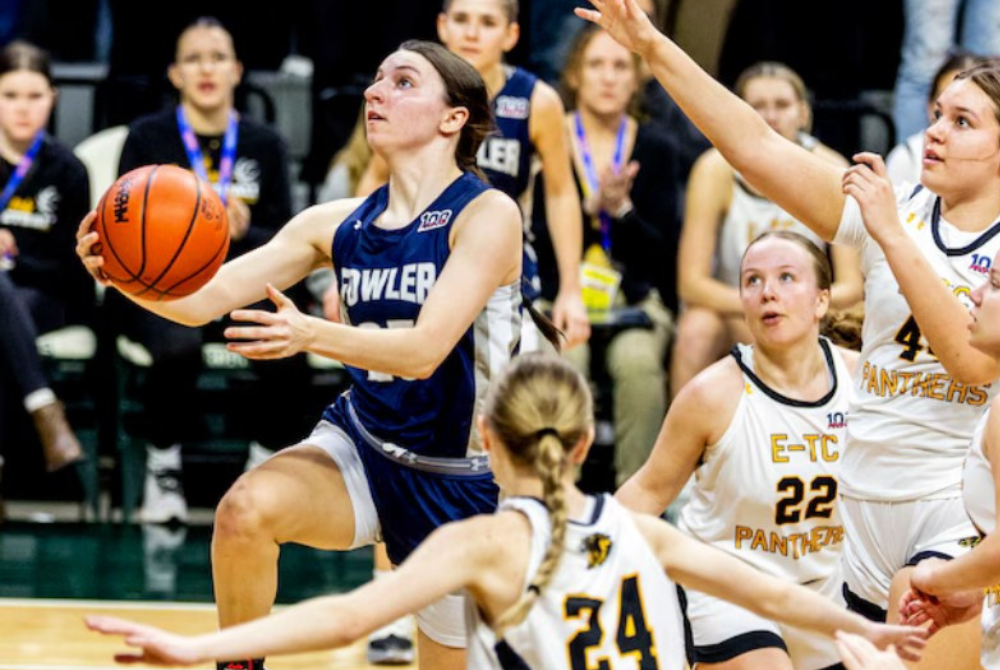
Cohen Champions Treatment, Technology
By
Geoff Kimmerly
MHSAA.com senior editor
March 10, 2014
Abby Cohen was looking for a problem to solve.
Two years later, she’s potentially only one more year from helping relieve a medical dilemma faced by 25 million Americans.
And the most impressive part might be that she graduated from high school a mere five years ago and is 23 years old.
 Cohen, a 2009 MHSAA Scholar-Athlete Award winner as a senior at Bloomfield Hills Cranbrook-Kingswood, certainly could be called proactive, going back to her days as a volleyball, basketball and soccer standout for the Cranes. Less than a year after graduating from Washington University in St. Louis, Mo., she’s co-founder and co-CEO of Sparo Labs, which seeks to provide asthma sufferers with a proactive way of monitoring their symptoms and improving their treatments.
Cohen, a 2009 MHSAA Scholar-Athlete Award winner as a senior at Bloomfield Hills Cranbrook-Kingswood, certainly could be called proactive, going back to her days as a volleyball, basketball and soccer standout for the Cranes. Less than a year after graduating from Washington University in St. Louis, Mo., she’s co-founder and co-CEO of Sparo Labs, which seeks to provide asthma sufferers with a proactive way of monitoring their symptoms and improving their treatments.
“Everyone has a different perspective on how to go about doing things,” Cohen said. “For me, growing up trying to improve in sports, I’d write down a list of things to do every day and actually do them, follow through. That aspect of always wanting to get better, and improve, is something that’s carried through to the rest of what we do at Sparo and in general how I approach things.”
 On March 22, the MHSAA and Farm Bureau Insurance will recognize a 25th class of Scholar-Athlete Award winners. In advance of the celebration, Second Half has caught up with some of the hundreds who have been recognized (see additional links at the bottom of this page).
On March 22, the MHSAA and Farm Bureau Insurance will recognize a 25th class of Scholar-Athlete Award winners. In advance of the celebration, Second Half has caught up with some of the hundreds who have been recognized (see additional links at the bottom of this page).
Cohen, who also served on the MHSAA Student Advisory Council from 2007-09, chose Washington based on its strong engineering problem and successful women’s basketball program. She studied bio-medical engineering and was a freshman on the Bears team that defeated Hope College for the Division III national championship in 2010.
But that first season was followed by a series of ankle injuries that required reconstructive surgery – and, effectively, ended her collegiate sports career. She still can play pick-up games, but four-hour daily practices and the other commitments of a varsity program would've been too much.
She missed basketball. But the end of her competitive career on the court, as it turned out, allowed more time to dive into a new pursuit – and, in her words, “work with another kind of team.”
“I’m a big believer in everything happens for a reason,” Cohen said. “It was disappointing having to have surgery to make everything feel better, for the long term, not just basketball. For me at that time, I didn't appreciate that with the extra time I could have, I could take the time to try new things, make the world a better place.”
Cohen planned at first to eventually become a physician. She shadowed a number of doctors, but decided that in the long run she could have a greater impact as an engineer designing products physicians could use.
In addition to her classwork, she helped form an extracurricular entrepreneurial group – and set out for an issue in need of repair. She and her now-business partner Andrew Brimer didn't realize how many Americans are affected by asthma, “that respiratory diseases are the only ones getting worse over time rather than getting better. That although technology is improving, why it’s not making a dent.”
They set out find out and make that dent themselves.
Through a series of interviews with patients, doctors, respiratory therapists and others in the field, Cohen and Brimer got an idea what could help – an affordable, easy-to-use device to allow patients to monitor on their own their symptoms so they can better manage them and the treatments to help. Cohen and Brimer designed a device that plugs into a smart phone and allows patients to blow into it like a whistle and register lung function readings – while also collecting data on medications, pollen counts, and other variables that affect lung function. Their device also should dent the health care costs that go with current testing, which generally requires an office visit.
Sparo will work over the next six months to improve its app interface and user experience, and then submit for Food and Drug Administration approval at the end of this year or the beginning of 2015 – with the hope it will then become available to patients later next spring.
Cohen is based in St. Louis, where she and Brimer have been able to work with three large local hospitals and within a nurturing entrepreneurial community. Brimer's brother owns a tech education company in New York which has provided additional support as she and Brimer discussed what was possible. “We were talking to patients and physicians, and it just seemed like the right thing to do,” Cohen said. “If we weren’t going to do this, who was?”
Cohen and Brimer have won 9 of 11 entrepreneurship grant competitions they've entered, netting more than $300,000 to get their lab rolling and allow them to hire two more engineers. Long-term, today’s work could just be the start of what Cohen hopes eventually will reach into developing countries as well.
She remains in touch with a number of teachers at Cranbrook-Kingswood – also, her mother Sheila Cohen teaches sixth-grade math at the school – and she spoke there at the end of 2013 as part of a TEDx event.
As she continues to build her team, Cohen is reminded of additional lessons she learned on the courts and soccer field – including a major one that will continue to pay as Sparo expands.
“Learning how to work on a team, with really different personalities, different people who all play different roles,” Cohen said. “That really came from sports – the ability to work with people and reach one common goal.”
Click to read the series' first installments:
- 25 Years Later, Scholar Athletes Shine On
- On Call as Doctor, Director, Mom
- "Mailloux Management" Goes Global
- Goorhouse Gives Back at Home
PHOTO: Abby Cohen (10) helps her teammates hoist a trophy while a player at Bloomfield Hills Cranbrook-Kingswood in 2009. (Photo courtesy of Cranbrook-Kingswood.)

Performance of the Week: Fowler's Katie Spicer
March 27, 2025
Katie Spicer ♦ Fowler
Senior ♦ Basketball
After leading Fowler in scoring all season, Katie Spicer capped off her senior year with a game-high 17 points in a commanding 53-29 win over Ewen-Trout Creek in the MHSAA Division 4 Final. She also added three rebounds and three assists in the championship victory. Just two days earlier, Spicer helped lift the Eagles past Genesee Christian in the Semifinals, contributing 12 points and seven rebounds.
Spicer averaged 12.5 points per game this season, helping Fowler to a 27-2 record. After falling in the Semifinals in both 2023 and 2024, the Eagles broke through to claim their third Division 4 title over the past five years – and their fourth overall. In addition to her basketball success, Spicer played a key role on the 2024 Fowler girls track & field team that captured the LPD4 Finals championship. She finished second in the 100-meter dash, third in the 200, sixth in the 400, and second in the long jump. Spicer will continue her athletic career at Saginaw Valley State University, competing in track & field.
Follow the MHSAA on TikTok.
MHSAA.com's "Performance of the Week" features are powered by MI Student Aid, a division within the Department of Lifelong Education, Advancement, and Potential (MiLEAP). MI Student Aid encourages students to pursue postsecondary education by providing access to student financial resources and information. MI Student Aid administers the state’s 529 college savings programs (MET/MESP), as well as scholarship and grant programs that help make college Accessible, Affordable and Attainable for you. Connect with MI Student Aid at www.michigan.gov/mistudentaid and find more information on Facebook and Twitter @mistudentaid.
Previous 2024-25 honorees
March 21: Moses & Markus Blackwell; Warren Lincoln basketball - Report
March 13: Keyshawn Summerville, Lansing Sexton basketball - Report
March 6: Maggie Buurma, Fowlerville wrestling - Report
Feb. 28: Maren Studt, Pontiac Notre Dame Prep skiing - Report
Feb. 21: Olive Krueger, Marquette swimming - Report
Feb. 14: Hunter Lemmon, Fraser swimming - Report
Feb. 7: Aubrey Hillard, Rochester competitive cheer - Report
Jan. 31: Wyatt Spalo, Reed City wrestling - Report
Jan. 24: Olivia Flynn, Harbor Springs basketball - Report
Jan. 17: Levi Rozema, Holland Christian swimming - Report
Jan. 10: McRecco McFadden, Burton Bentley basketball - Report
Dec. 18: Nash Leonard, Bay City Western hockey - Report
Dec. 11: Blake Cosby, Dundee wrestling - Report
Dec. 4: Keaton Hendricks, Zeeland West football - Report
Nov. 29: Kate Simon, East Grand Rapids swimming - Report
Nov. 22: Ella Kokaly, Essexville Garber volleyball - Report
Nov. 15: Caroline Bryan, Grosse Pointe South swimming - Report
Nov. 8: Kaylie Livingston, Whitmore Lake cross country - Report
Oct. 25: Oliver Caldwell, Grand Rapids West Catholic tennis - Report
Oct. 18: Alex Graham, Detroit Cass Tech football - Report
Oct. 11: Victoria Garces, Midland Dow cross country - Report
Oct. 4: Asher Clark, Bay City John Glenn soccer - Report
Sept. 26: Campbell Flynn, Farmington Hills Mercy volleyball - Report
Sept. 19: TJ Hansen, Freeland cross country - Report
Sept. 12: Jordan Peters, Grayling soccer - Report
Sept. 6: Gabe Litzner, Sault Ste. Marie cross country - Report
Aug. 30: Grace Slocum, Traverse City St. Francis golf - Report

